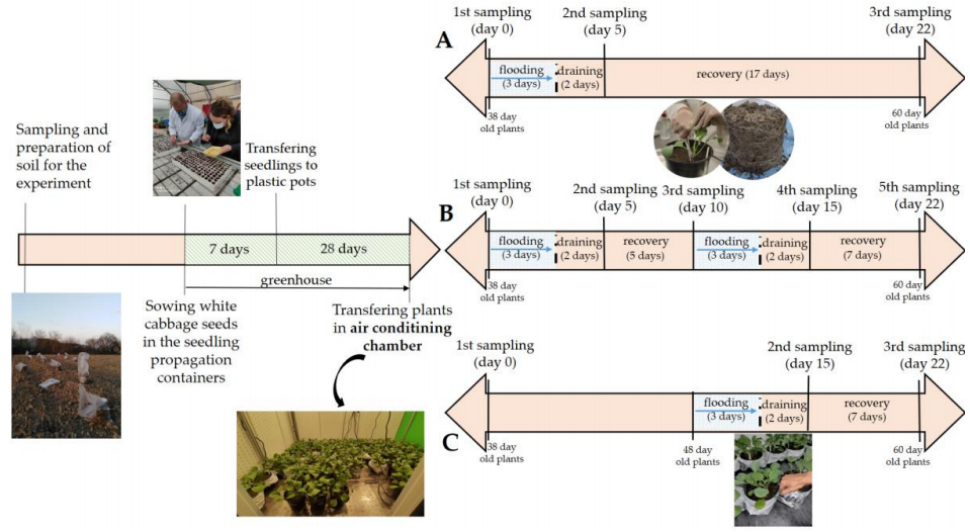品质至上,客户至上,您的满意就是我们的目标
技术文章
当前位置: 首页 > 技术文章
WIWAM植物表型成像系统叶绿素荧光成像模块:白甘蓝对单次和多次短期内涝的响应
发表时间:2023-05-12 13:37:54点击:870
来源:北京博普特科技有限公司
分享:


摘要
气候变化对农业部门产生了重大影响,对植物的生长和发展产生了负面影响,预计未来将对粮食供应产生严重影响。尽管我们正在经历更频繁、更强烈的强降雨事件,这是农田洪水的主要原因,但对这些事件对不同作物的影响仍知之甚少。在本研究中,我们研究了内涝对模式植物白甘蓝(Brassica oleracea var.capitata f.alba)的影响,目的是跟踪其对单次和反复短期(72小时长)内涝的反应,并跟踪不同生长阶段植物(38天和48天龄植物)之间的敏感性差异。在我们为期22天的实验中,在完全受控的条件下(16小时白天/8小时夜晚,25°C白天/20°C夜晚,60-70%的相对空气湿度,250µmol m−2 s−1的光合活性辐射)进行沉降,目的是更全面地认识到内涝对植物的影响,我们在多个水平上测量了植物的变化:(i)在其形态特征(叶片的数量和长度、叶面积和叶片宽度)内,(ii)在叶绿素荧光和多光谱特征(20个参数)内,以及(iv)植物的元素和矿物组成的变化。根据我们的研究结果,白甘蓝对内涝不太敏感,只有反复遭受内涝的植物才会表现出充血应激的迹象。在分子胁迫参数水杨酸和脱落酸的变化中观察到的这些迹象,在地上水平上并不那么明显。我们没有观察到植物形态的变化,也没有观察到它们的光合性能的变化。此外,消除内涝胁迫使我们的模型植物完全恢复,这表明白甘蓝有迅速的适应反应。随着预计洪水事件发生频率的增加,认识到作物对洪水高度敏感,以努力适应不断变化的气候将变得越来越重要
关键词:白甘蓝;气候变化;内涝;形态特征;应力参数;光合能力;养分含量
Response of White Cabbage (Brassica oleracea var. capitata) to Single and Repeated Short-Term Waterlogging
Abstract
Climate change has a significant impact on the agricultural sector, negatively affecting plants’ growth and development, with predicted strong consequences on food availability in the future. Although we are experiencing more frequent and intense heavy rainfall events, a major contributor to field flooding, there is still not much known about the impact of these events on different crops. In this study, we investigated the effects of waterlogging on a model plant white cabbage (Brassica oleracea var. capitata f. alba), with the aim to follow its response to both single and recurrent short-term (72-h length) waterlogging, as well as to track difference in the sensitivity between plants in different growth stages (38- and 48-day-old plants). In our 22-day experiment, settled under fully controlled conditions (16 h day/8 h night, 25 °C day/20 °C night, 60–70% relative air humidity, 250 µmol m−2 s−1 photosynthetic active radiation), with the aim to more comprehensively recognize consequences of waterlogging on plants, we measured changes in plants on multiple levels: (i) within its morphological traits (number and length of leaves, leaf area, and blade width), (ii) within chlorophyll fluorescence and multispectral traits (20 parameters), (iii) following the levels of plant stress parameters (salicylic acid, abscisic acid, proline, and total polyphenols), and (iv) following changes in the plants’ elemental and mineral composition. According to our results, white cabbage was shown not to be very sensitive to waterlogging, with only plants exposed to repeated waterlogging showing signs of the congestion stress. These signs, observed in the changes of molecular stress parameters salicylic and abscisic acids, were not so clearly evident at the aboveground level. We did not observe changes in the plants’ morphologies, nor their photosynthetic performance. In addition, removal of waterlogging stress resulted in complete recovery of our model plants, suggesting a prompt adaptation response of white cabbage. With the projected increased frequency of occurrence of flooding events, it will become increasingly more important to recognize crops being highly sensitive to flooding with the aim to try to adapt to the changing climate.
Keywords:
white cabbage; climate change; waterlogging; morphological characteristics; stress parameters; photosynthetic ability; nutrient content
相关阅读